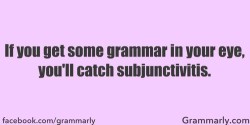
Verbs are active little things. If you have been hiding under a rock and don’t know what a verb is, it is an action word like jump, think, write, read, eat, hide.….or a state of being like the verb to be (and its forms: are, am, is).
Verbs, of course, have tense, which tells you when something happened. I am running (present tense) indicates a different time than I was running (past tense).
Verbs also have voice: active or passive. When a verb is used in the active voice, the subject is performing the action of the verb. When a verb is used in the passive voice, the subject is not doing anything. Here are examples:
Active Voice: I am driving to the mall.
Passive Voice: I am being driven to the mall.
Verbs also have mood. There are three moods:
Indicative is the usual mood. (Don’t worry about this one.)
Imperative is the command mood. (Don’t worry about this one either.)
Subjunctive is the other mood, You might have to worry about this one.
Subjunctive mood is used for sentences that express demand, request, necessity, urging, resolution, wishful thinking, and improbability. Generally, we use the subjunctive without even thinking about it. It is only the last two (wishful thinking and improbability) that trip us up — that is, if we are native English speakers. I can see where the other uses would be problematic for those whose native language isn’t English (although other languages have subjunctive mood as well).
All right, already! Can we have some examples here? Of course.
Demand: I insist that I be allowed to go! (not that I am allowed to go)
Request: The parents have asked that they be notified if Johnny fails a test. (not that they are notified)
Necessity: It is necessary that I be given enough money to cover expenses. (not that I am given)
Urging: We strongly suggest that Johnny be given an A on his report card. (not is given)
Resolution: It was decided that I be the chair of the decorations committee. (not that I am)
The above examples are all in subjunctive mood.
Okay. Those were pretty easy, and I am sure you use them without even thinking about it. Of course, you can use the other verb (in parentheses), but it has a different meaning, and will not imply demand, request, necessity, urging, or resolution.
Examples:
I told you that I am allowed to go out on Friday nights. (no demand here)
The parents are notified every time Johnny fails a test. (no request here)
I hope that I am given enough money to cover expenses. (no necessity here)
Johnny is being given an A on his report card. (no urging here)
I am the chair of the decorations committee. ( no resolution here)
The verbs in the above sentences are indicative mood.
Wishful Thinking: This is one of the subjunctive uses that trips us up. Whenever you use wish, you need to use the subjunctive mood.
Examples:
I wish I were going to Paris with you. Not I wish I was going to Paris with you.
He wishes he were taller. Not He wishes he was taller.
Improbability: This is the other subjunctive use that trips us up. When you use an if or as if clause, use the subjunctive if the sentence implies improbability.
Examples:
If I were you, I wouldn’t go to Paris in the winter. Not If I was you, I wouldn’t go to Paris in the winter.
She acted as if she were the boss. Not She acted as if she was the boss.
Many people do not use the subjunctive mood with wish and if these days, but it is still correct. There are other tenses and verbs, of course, that take subjunctive, but it is the examples above that are the most commonly incorrect.
If I were a rich man, da-da-da-da-da-da-da-da-da-da-da-da-da…...
Thank you, Frances Caballo, for the suggestion to discuss subjunctive mood!



Thank God somebody cleared this up. I’ve been correcting the was-becomes-were-in-the-presence-of-‘If’ problem on client manuscripts for years. I attributed my reasoning to “Something to do with the Subjunctive or a bunch of medieval monks or something — I heard about it in high school.” Now, at last, I can sound like I know what I’m talking about!
Like I sounded as if I knew what I was talking about….Sometimes I need a little help too and need to do some research!
Thank you!! I should send this to one of my former CELTA tutors. I clearly remember the argument we had on this topic. He gave “I wish he was here” as an example of past simple. I explained to him that: 1) it’s not correct, as it should be “I wish he were here” and 2) it is subjunctive, not past simple (another example was “I’d rather you left” – also presented as past simple). His argument: the language changes and since everyone says “was” instead of “were” in sentences such as the one mentioned; as for saying it was past simple instead of subjunctive: they have the same form anyway.
Ugh!!!! It was so frustrating!
You’re welcome. Glad we are in agreement!
Very helpful if I were in the mood to be praisingly.
Glad you are not in the mood to be “praisingly”!
A very interesting article.
Thank you!